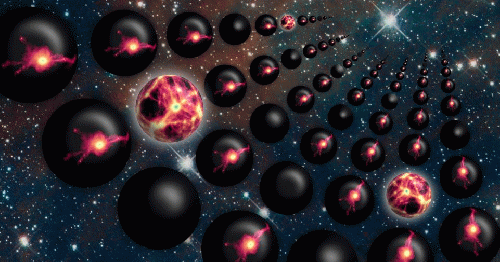"The universe" is, by definition, everything we can ever know anything about. It's hard enough to know about things (in our one universe) that are small and far away, at temperatures beyond what we can create in a laboratory. It's hard enough to know details of our evolutionary past, unable to do experiments, dependent on a spotty fossil record and conflicting studies of DNA similarity. I'd say science has enough on its plate with trying to figure out this universe. There's no need to take on other universes, about which we can know nothing.
Last week, I wrote about the Anthropic Principle, which prompted mainstream astronomers to postulate the existence of zillions of other universes to avoid the alternative inference: that life is as primary as physics--that the purpose of our universe is to be a home for life.
There is another realm where physicists have postulated the existence of (even more unthinkably many) extra universes in order to save their 19th Century worldview. That is in quantum mechanics.
QM is a set of equations for determining how the wave function changes over time. Roughly speaking, if you know how the probability of a particle's presence is spread out over space at any one time, you can use the QM equation to project that same knowledge into the future, to tell you, for example, what the probabilities will be for finding the particle at various points in space one second from now. This is the mathematically-intricate but unmysterious part of QM.
The mysterious part is what happens when an observation is made. All of a sudden, the wave function stops being what it used to be, and all probability becomes concentrated at a single point in space, where you saw the particle in your observation. Then the equation picks up from there to start projecting a new future, based on your new knowledge.
The problem with this is: "What do you mean by an observation?" If an observation is made by a physical system, then that physical system is governed by the same QM equations, and it shouldn't be treated as an observation at all--just a more inclusive wave function that comprehends both systems. Why should you need special rules for observations? Aren't Geiger counters and cloud chambers just physical systems subject to the rules of QM? For that matter, aren't human scientists just physical systems subject to the same rules as non-living systems?
The standard answer these days is to say that there are no observations, only different universes in which we might find ourselves, different universes in which the electron was here and it was there, different universes in which the photon spins clockwise or counter-clockwise, different universes in which the electron went through the left slit and in which it went through the right slit. Every particle, every billionth of a billionth of a second, is splitting the universe into copy universes, each a tiny bit different from the other universes, each going its own way. This is called the Many Worlds Interpretation of QM. "Many" is the biggest understatement in science.
The reason the Many Worlds Interpretation has become popular is simply to avoid the alternative implication: that there is something outside of physics that is doing the observing. In the MWI, all you need is a universal wave function--but a universal wave function for each universe, and there is a god-awful proliferation of universes.
In the minority view, there is just one universe, but it contains consciousness in addition to wave functions. It is consciousness that collapses wave functions, and consciousness has an independent existence, separate from matter, able to influence matter (by making observations, collapsing the wave function). Various versions of this view were promoted by such luminaries as von Neumann, Wigner, Bohm, and Schrà �dinger himself. Evidence for a direct effect of human intention on quantum probabilities has been reported from experiments by Robert Jahn and Dean Radin.
This story is another instance in which science is crying out for an interpretation congruent with ancient mystical ideas, but the science establishment recoils and invents a gazillion universes to avoid having to associate with mysticism.






